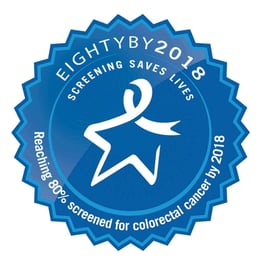August 22nd, 2016 | 2 min. read
By PMDhealth

PartnerMD is passionate about prevention-focused health care and helping our members potentially avoid disease through early detection.
We’ve joined the National Colorectal Cancer Roundtable and hundreds of organizations across the United States taking a stand against colorectal cancer by committing to the 80% by 2018 colorectal cancer pledge. We’ve pledged to have 80 percent of our adult members that are between the ages of 50 - 70 years old screened for colorectal cancer by 2018.
Colorectal cancer is currently the second leading cause of cancer deaths. If the 80% by 2018 is successful, 277,000 fewer people will be diagnosed and 203,000 lives will be saved by 2030.

Cancer forms when a cell in your body multiples uncontrollably beyond what is necessary. Over time, this cell line compresses other cells or structures in the body, which inhibits other cells in the body from doing their jobs. Polyps – or abnormal growths – in the colon or rectum can become cancerous over time and lead to colorectal cancer.
There are several factors that will increase your risk of colorectal cancer including:
If any of these factors affect you, then you may need to make changes to your lifestyle to reduce your risk of colorectal cancer.
Early screening is essential to preventing or treating colorectal cancer. Polyps develop over time, which is why screening as young as 50 years of age is recommended.
Screenings allow for early detection and removal of precancerous polyps. There are many methods to test for colorectal cancer such as:
The recommended screening for you will depend on your age and risk factors and should be discussed with a physician.
There are many misconceptions about screening for colorectal cancer. If you are 50 years old (or older), you should speak with your physician about your screening needs, even if you have no family history. Studies have shown that colorectal cancer occurs mostly in people without any family history and colorectal cancer doesn’t always cause symptoms. Early screening and detection is the key to prevention.
The concierge care model affords physicians more time to spend with their patients so they’re able to talk about prevention and the steps needed to live a long and healthy life. PartnerMD physicians are dedicated to helping patients identify their unique risk factors and developing a personalized plan to maximize health.